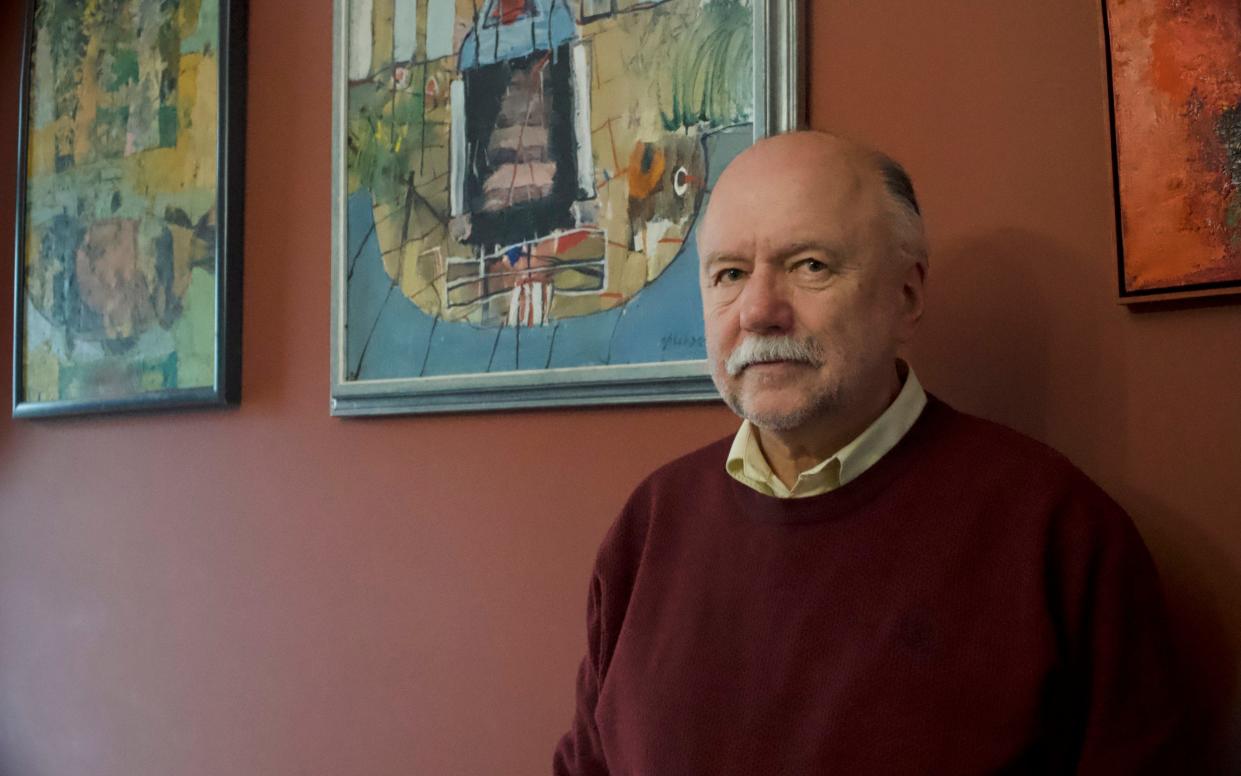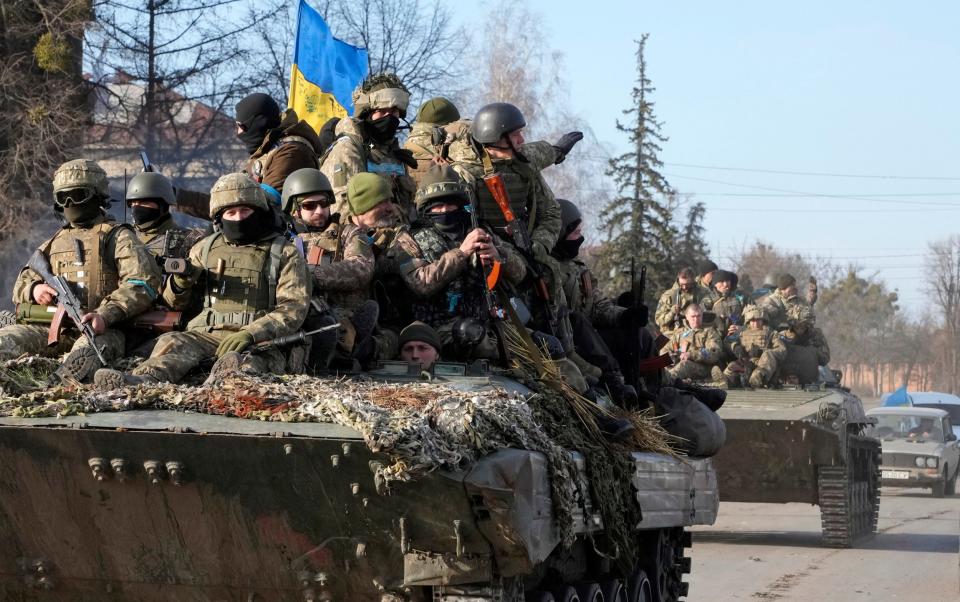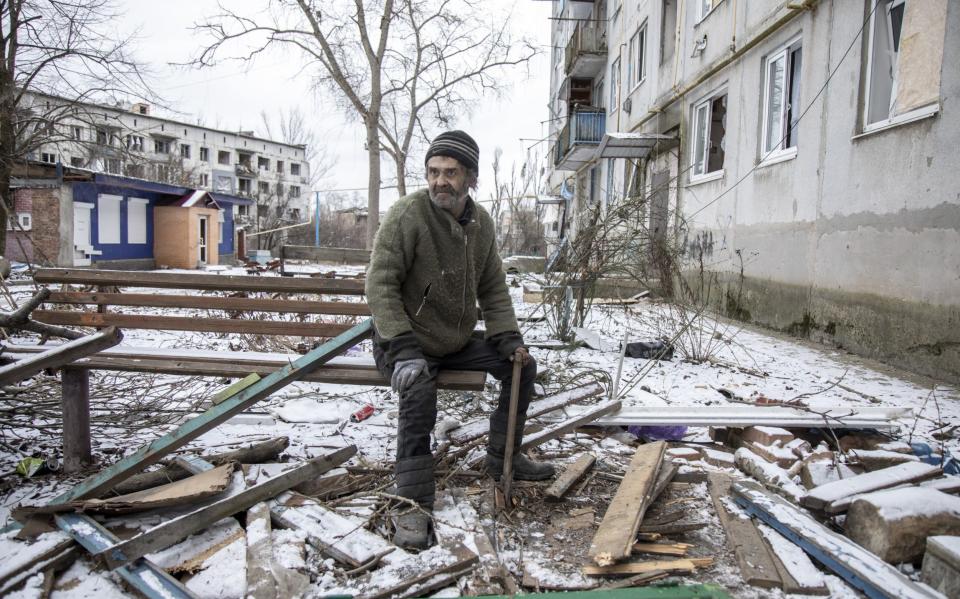Andrey Kurkov: ‘I expected Putin to escalate – but not to bomb us like Hitler’

- Oops!Something went wrong.Please try again later.
- Oops!Something went wrong.Please try again later.
In 2024, two years on from the start of the full-scale invasion of his country, Andrey Kurkov has no illusions about Russia’s intentions in Ukraine and what it means for the West.
“Putin will not give up while he’s alive. If he manages to destroy Ukraine, he will fight against the West in Moldova, in Lithuania, in Poland. And European leaders and politicians should understand that this is a potential Third World War. And it will reshape Europe and the European Union.”
We meet in Kurkov’s flat in central Kyiv. One of its high windows is crisscrossed with tape, a technique used to minimise the impact of shattering glass after a missile strike or shelling. He tells me about the dinner he made for close friends on the night before the invasion.
“I cooked borscht, and we were joking. I was saying that this is probably the last borscht in Kyiv. After midnight, when we were saying goodbye to each other, suddenly everybody started exchanging mobile numbers, just in case. And I took photos of this moment. All the faces of my guests were very worried and very concerned, and there were no smiles at all.”
By morning, Russia’s war of aggression had started in earnest. Tanks and troops were rolling across the border and missiles were striking major cities. For Kurkov, the full-scale invasion was a shock. A veteran of travelling to the front lines, the author was no stranger to death and violence, but it was the size of the invasion that surprised him.
“It was clear that this frozen war is not going to stay like this forever. Russia will never be happy with Crimea. For me, it was no surprise that a full-scale invasion started, although I didn’t expect this scale of it. I was expecting an escalation in Donbas. I wasn’t expecting a 1941-style of bombing the whole country, like Hitler did.”
Now 62, with a neat moustache and bright eyes, Kurkov is at the height of his fame. Born in St Petersburg, he had a string of eclectic jobs, including prison warder and screenwriter, before gaining international success as a novelist. His first, translated into English as Death and the Penguin, became a worldwide bestseller and was translated into 30 languages. Often surreal, bitingly funny and eerily prescient, Kurkov’s work reflects the profound cultural changes in Ukraine and Russia over the past 30 years.
Even prior to the Russian invasion of Ukraine (he and his English wife, Elizabeth, escaped to their house in the country initially, before returning to the capital), Kurkov had written about working out how to live through a war.

In his 2018 novel Grey Bees, his pro-Ukrainian protagonist, Sergey Sergeyich, is caught up in the Donbas war. His village lies near-abandoned as Ukrainian and Russian forces shell each other over the disputed “grey zone”, and Sergeyich must walk a delicate line between two rival armies and his “frenemy” in the village.
However, Kurkov tells me that the war curbed his ability to write fiction. He abandoned a new novel for which he had written 70 pages. “On the first day, I almost couldn’t write anything. Just a couple of sentences in the diary. For me, writing is pleasure. And when I write, I am living in two worlds, the world I created for the novel and the world with my real friends, my real family and real problems. So my imaginary life was immediately removed from me.” (His latest novel, The Silver Bone, which is published in the UK on Tuesday, was written before the war.)
Following the start of the war, Kurkov threw himself into journalism instead, writing hundreds of articles for publications across the globe. The full-scale invasion also changed how the people of Ukraine thought about the Russian language.

Although the Ukrainian language is historically oppressed (in the 1930s, the Soviet authorities carried out a brutal purge of Ukrainian culture and language), more and more people have started speaking Ukrainian in recent years, and many are bilingual. Since the 2022 full-scale invasion, some have even abandoned Russian altogether, rejecting any association with the “aggressor” country.
Kurkov, whose mother tongue is Russian, tells me: “My books are now not published in Russian, because bookshops in Ukraine don’t want to sell books in Russian, because Putin turned the language into the language of the enemy, in spite of the fact that 30 to 40 per cent of Ukrainians are Russian-speakers. Now, lots of people are changing language, switching to Ukrainian.”
Kurkov’s own works were banned in Russia in 2014, the year he first began to go to the front lines. But, he says: “There will be a niche for Russian-language literature. I don’t know if it will be a ghetto, or whether it will be a kind of club, closed-community literature. But it will survive.”
You can listen to David Knowles interview Andrey Kurkov on Ukraine: the Latest, The Telegraph’s daily podcast on war in Ukraine, using the audio player at the top of this article or on Apple Podcasts, Spotify, or your favourite podcast app.

